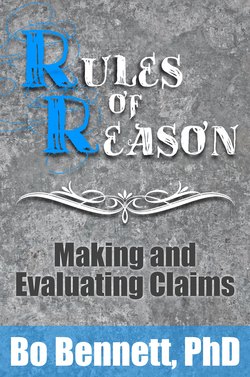Читать книгу Rules of Reason - Bo Bennett PhD - Страница 4
На сайте Литреса книга снята с продажи.
Introduction
ОглавлениеA claim is defined as a statement that something is the case, typically without being supported by evidence or proof. Unlike opinions, claims are independent of values and beliefs. The truth of the claim is unaffected by who makes the claim whether it be a staunch conservative or a life-long liberal. Consider this claim:
My husband is having sex with another woman.
If proof or convincing evidence was provided as part of the claim, the evaluation would be more of an exercise of validating the evidence, which is beyond the scope of this book. For the sake of comparison, however, let’s look at this claim presented with evidence.
I caught my husband having sex with another woman. I recorded it and uploaded it on MyHusbandisaCheatingBastard.com. I also uploaded a copy on MyHusbandsMistressisaTramp.com. While I was at it, I added Spanish subtitles and uploaded a copy to NoBuenoelEsposo.com.
When evidence is provided, reviewing the evidence is the “low-hanging fruit” of claim evaluation, meaning it is quite often the quickest and most accurate way to confirm that which was claimed to be the case is indeed the case. Too often, however, the wrong evidence is sought after based on a weak claim. Consider the following:
My husband is cheating on me with another woman. A woman at the nail salon mentioned that her husband’s bowling buddy saw my husband talking closely for hours with a woman who wasn’t me.
We can argue that this is not evidence for her husband cheating on her and the woman making the claim can argue that it is clear evidence, and we can both be right. The claim is weak because it is ambiguous; we don’t know what “cheating” refers to in this case. The woman might be defining “cheating” as emotional intimacy with another person who is not family. We might define “cheating” as having sex with a person who is not your spouse. We should not focus on the evidence until we fully understand the claim.
Depending on the claim, good-quality evidence might not even be possible. If a claim is falsifiable, it means that evidence can exist that proves the claim to be false. For example,
“Anybody that wants a test can get a test. That’s what the bottom line is.”
All it would take to falsify this claim is for someone, anyone, to want a test, attempt to get it, and fail.
Claims can also be unfalsifiable, which means no evidence can exist that would prove the claim to be false. Consider the following claim:
You can have anything you want as long as you want it badly enough!
Through probability alone, some people will get what they want, and some people won’t. Those who get what they want lend support to this claim and those who don’t either just didn’t get it yet since no timeframe was specified or it can be claimed that they simply didn’t want it badly enough, in either case, not taking away from the credibility of the claim. This is what gives staying power to such claims and make unfalsifiable claims prime drivers of pseudoscience, marketing scams, and religions.
Sometimes, the probability of claims being true is not mathematically calculable; that is, their probabilities are unknowable. Recall that our goal in this book is only to evaluate the strength of the claim and not how likely the claim is to be true. But we do need to briefly look at how an unknown probability affects the veracity of the claim. Consider the following claim:
Jesus was raised from the dead.
The fact is, we have zero proven or demonstrated cases of anyone ever being raised from the dead, but many claimed cases. Given this, we can’t calculate the percent chance that Jesus was raised from the dead. We can use what is called Bayesian statistics to estimate a probability, but this requires initial assumptions that make the estimated percent highly susceptible to bias. When we can’t calculate a probability, we can still compare claims to competing claims and make use of the principle of parsimony to choose the more reasonable claim.
Consider the following claims:
1. The God of the Bible created the universe.
2. There was some god who created the universe.
3. Something caused the universe to come into existence.
Note that there is no reason all three claims can’t be true. Just because they are competing doesn’t mean they are contradicting. Although we cannot calculate the probabilities of any of these claims, we know that statistically, claim #3 contains the fewest assumptions and is, therefore, most likely to be true. Claim #2 contains claim #3, plus it adds all of the properties of what a “god” is. Claim #1 contains claims #2 and #3, plus all of the properties as written in the Bible. Even though it is more likely that “something” caused the universe to come into existence than “the God of the Bible” created the universe, the claim that “something” caused the universe to come into existence is not very helpful and somewhat pointless, which is why we often sacrifice probability for a more specific claim.
Now that you have a decent primer on the issues with claims let’s get into the eleven rules of reason for making and evaluating claims.
